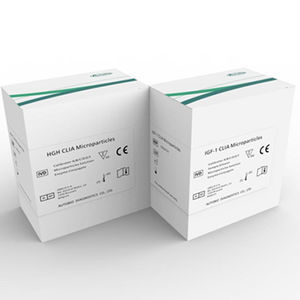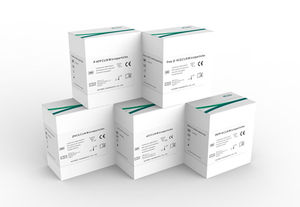
- Laboratory
- Laboratory medicine
- Ovulation test kit
- Autobio Diagnostics
Ovulation test kit CMF0102FSHLHprogesterone
Add to favorites
Compare this product
fo_shop_gate_exact_title
Characteristics
- Application field
- ovulation
- Tested parameter
- FSH, LH, progesterone, prolactin, testosterone, electrolyte
- Sample type
- clinical, serum, sperm
- Sample volume
0.02 ml, 0.025 ml, 0.05 ml
(0.00068 US fl oz, 0.00085 US fl oz, 0.00169 US fl oz)
Description
Sex hormones are steroid hormones synthesized in the gonad, placenta, adrenal cortex zona reticularis as well as other tissues. They have the physiological functions of facilitating the maturation of sexual organs and the development of secondary sexual characteristics as well as maintaining sexual functions. Clinically, sex hormones are often detected by serological methods.
Clinical Significance
Luteotropic hormone (LH) is a gonadotropin secreted by the pituitary.Its secretion is regulated by gonadotropin-releasing hormone produced by the hypothalamus, and also by female menstrual cycle. LH can facilitate female ovulation and corpus luteum formation, and stimulate the corpus luteum to produce progesterone and oestrogen. In male body, LH can facilitate the synthesis and secretion of testosterone.
Human follicle-stimulating hormone (FSH) is a gonadotropin secreted by anterior pituitary. For females, FSH can facilitate follicle to maturate and secrete oestrogen. For males, FSH is required to regulate vas deferens growth and maintain sperm production. Males with azoospermia and oligospermia usually have an elevated FSH level.
Prolactin (PRL) is secreted by anterior pituitary in both male and female.It plays an important role in the growth and development of the organism and mammary glands, lactation, gonad development and the regulation of water-electrolyte metabolism.In males, it is also important to the growth of gonad and accessory gonad and maintaining their functionality.
Testosterone is produced by leydig cells.In male's blood circulation, 95% of the testosterone is secreted by testicles, whereas in women's blood,
Catalogs
No catalogs are available for this product.
See all of Autobio Diagnostics‘s catalogsRelated Searches
- Autobio test kit
- Solution reagent kit
- Autobio blood test kit
- Autobio serum test kit
- Plasma assay kit
- Infectious disease detection kit
- Diagnostic reagent kit
- Respiratory infection test kit
- Autobio clinical test kit
- COVID-19 detection kit
- Clinical chemistry analyzer
- Bacteria reagent kit
- Antigen assay kit
- Automatic clinical chemistry analyzer
- Autobio cancer test kit
- Clinical reagent kit
- Benchtop clinical chemistry analyzer
- IgG test kit
- Laboratory detection kit
- Autobio cell test kit
*Prices are pre-tax. They exclude delivery charges and customs duties and do not include additional charges for installation or activation options. Prices are indicative only and may vary by country, with changes to the cost of raw materials and exchange rates.



